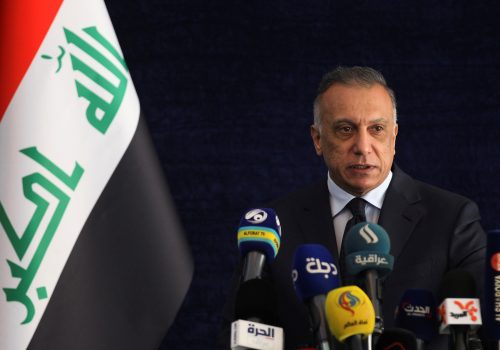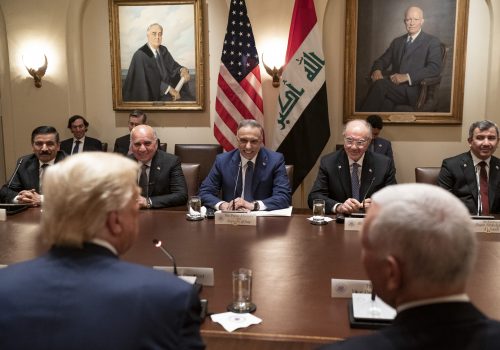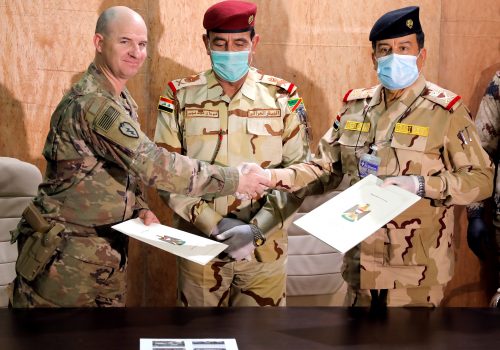Does the United States need an embassy in Baghdad?
Iraq remains a country of great importance to the United States and it would be foolish to deprive Washington of a tool for assessing and hopefully influencing conditions in Iraq.
The recent report of a high-level proposition to close the US embassy in Iraq is not completely surprising. 2020 is a year that has seen violent attacks on both US and Iraqi targets by pro-Iranian militias. There has also been terrorism on the part of remnants of the Islamic State of Iraq and al-Sham (ISIS), which was hostile to the US, Iraqi government, and Iran. It is also a year that began with a targeted assassination by the US that killed both Iran’s top general, Qasem Soleimani, and Iran’s top Iraqi client, Abu Mahdi al-Muhandis. This is a turbulent environment during an election year when some might wish that US diplomats and military personnel were in a safer place.
On the other hand, Iraq’s Prime Minister Mustafa al-Kadhimi is perhaps the most promising person to take over since the overthrow of dictator Saddam Hussein in 2003. In combination with other leaders in the Iraqi government, the prime minister is committed to building a relationship with the US based on a broad range of mutual interests that goes beyond just a military presence. Security cooperation will remain one component of those interests, but it should not be the basis for the US presence.
Leaders in key positions that are able to manage a country with Iraq’s economic potential and pivotal geo-political location are essential. Prime Minister Kadhimi, President Barham Salih, and other leaders in the current government are able to take on this task. It was only one month ago, in August, that Kadhimi visited Washington and officials of the two countries launched a strategic dialogue that covers key issues ranging from economic cooperation to educational exchange. On the spiritual side, Grand Ayatollah Ali Sistani has provided encouragement for the elections announced by Prime Minister Kadhimi and has spoken against foreign interference with Iraq’s sovereignty.
The Iraqi government needs to take measures that would protect both the US Embassy and Iraqi military installations where US and Iraqi personnel are co-located. Both governments need to focus on this pressing task, rather than questioning whether it is desirable to have US diplomats in Baghdad.
Going without a US diplomatic presence in an important country for years or even decades has precedents in US foreign policy. This was true of China from 1949 to 1979. It has been true of Iran since 1980. The reader can judge whether that served the national security interests of the United States during those periods. Few, if any historians, would argue that it did with regard to China. History’s verdict is evolving in the case of Iran, but it is likely to be negative.
It was also true of Iraq from the closure of the US Embassy in 1967 until the resumption of diplomatic relations in 1984. The presence of a US Interests Section in Baghdad and an Iraqi Interests Section in Washington during the late 1970s and early 1980s provided a degree of diplomatic dialogue, but it was limited in scope. I served in Baghdad in the late 1970s and there were strict limits on my movements and level of access to the Iraqi government. The absence of normal diplomatic engagement harmed the interests of both countries. Closing the US Embassy in 2020 or 2021 would shut off opportunities beneficial to Americans and Iraqis alike. It might even be a short-term win for Iran. But it is certain that the long-term gains will accrue on the side of the forces of instability that threaten Iraq and its neighbors, as well as the United States.
Why do we have embassies in foreign countries where we do not have ideal relations? Where the culture and political environment is unfamiliar to most Americans and seems hostile? If we lived in a world where the countries that offered productive cooperation or challenging competition were no more alien than Canada or Denmark, there would be minimal need for diplomacy. Obviously, that is not the world we live in. Even in the late eighteenth century, our early statesmen saw the need for Americans to have channels for influencing and informing ourselves about diverse states that are different and even a bit scary to many Americans.
Iraq is such a country.
David Mack is a nonresident senior fellow with the Atlantic Council’s Middle East Programs.
Sign up for all the latest updates!
Sign up for the MENASource newsletter, highlighting pieces that follow democratic transitions and economic changes throughout the region.
Image: U.S. Embassy security men use stun grenades to disperse protesters and militia fighters during a protest to condemn air strikes on bases belonging to Hashd al-Shaabi (paramilitary forces), outside the U.S. Embassy in Baghdad, Iraq January 1, 2020. REUTERS/Thaier al-Sudani


